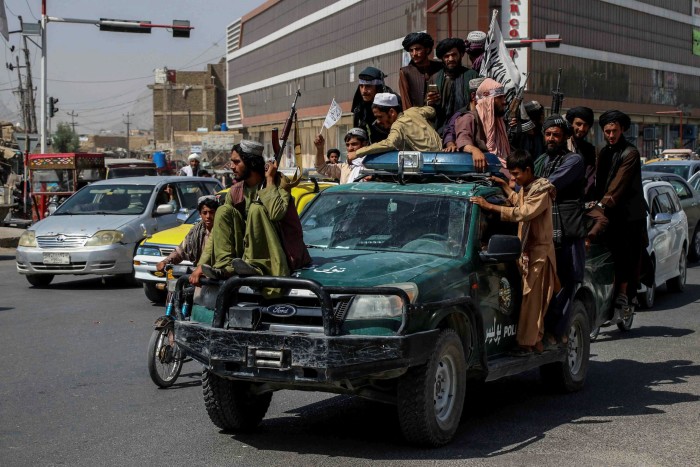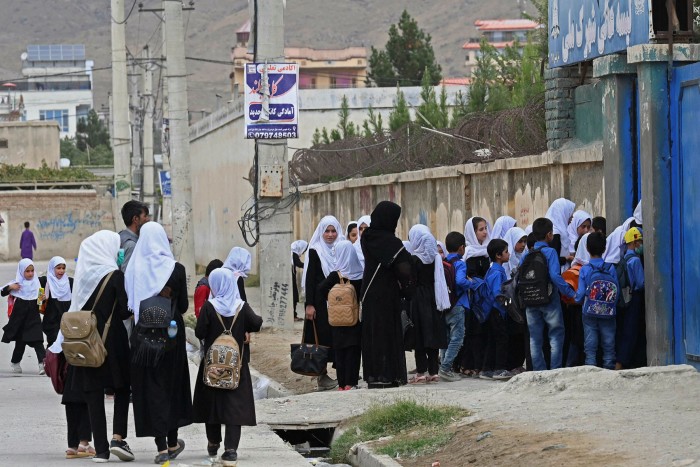As Taliban fighters celebrated the departure of US troops from Afghanistan, Aalia, a 40-year-old high school teacher, was outside a bank trying to get cash to buy groceries.
Banks have been mostly closed since the Taliban marched into Kabul more than two weeks ago. The few branches that have reopened have imposed strict withdrawal limits, leading to day-long queues and disruptions to the cash-dependent economy.
“Since 6am, I have been standing here in the queue,” Aalia told the Financial Times after Kabul’s night skies were pierced by Taliban fighters’ celebratory gunfire. “I have nothing left in my house and my kitchen.”
Aalia’s crisis reflected the disconnect between Taliban leaders’ euphoria at the US exit and the grave challenge they face in transitioning from an Islamist insurgency to a functioning administration.
Elite Taliban units equipped with high-end combat gear that analysts said was probably seized from the surrendering Afghan National Army swiftly took control of Kabul airport after the last Americans flew out. Anas Haqqani, scion of a prominent militant family aligned with the Taliban, told a local journalist the country had “achieved a freedom that has no precedent in the past”.
Many Afghan civilians were relieved that Kabul fell to the Taliban without first becoming a battleground, expressing hopes that the US departure would herald an end to the fighting and violence that has beset the country for two decades.
“I was very worried that there would be clashes and looting,” a cheese vendor in a residential neighbourhood said. “I was very happy that the Taliban came peacefully, there hasn’t been a clash and they prevented anarchy in the city.”

Yet ordinary Afghans were also sceptical that the Taliban had the skills to tackle the country’s complex socio-economic problems. Others were anxious about losing hard-won freedoms, especially for women, who were confined to their homes under a strict Islamic regime when the movement last held power from 1996-2001.
“The news of the Americans makes me happy — it is good that the war ends,” Aalia said. “But it is also important to work. It’s good to allow women [to work] as before . . . the government must pay attention to salaries that haven’t been paid in months. They must pay serious attention to the economic situation . . . the Taliban should not hire a mullah for the ministries of economy, finance and public health.”
Heavily armed Taliban fighters parading on Kabul’s streets on Tuesday were jubilant, as their leaders celebrated what they called Afghanistan’s “independence-day”.
Yet those associated with the former Afghan government who were not evacuated in the chaotic US airlift were left living in terror. Many were in hiding or moving from house to house as the Taliban searched for members of the former security agencies and forces.
“There is very clearly a list of people that they are going after — they are going to people’s houses, talking to their families and trying to track them down,” said Rudra Chaudhuri, a professor at the Department of War Studies at King’s College London.

The Taliban has yet to announce the contours of the new government, although the group was believed to have reached an agreement after a three-day meeting in Kandahar with their supreme leader, Hibatullah Akhundzada.
Analysts believed the process of forming an administration had been delayed by tensions between the group’s various regional factions over dividing responsibilities.
But Asadullah Waheedi, an assistant professor at Kabul University and expert on the Taliban, said the movement’s leaders were also debating whether they could include non-Taliban politicians in order to create the “inclusive administration” sought by the international community.
“The main hot discussion right now in the Taliban leadership is, ‘Are we allowed under sharia to share power with those from the corrupt former government’,” Waheedi said.
The Taliban is trying to encourage some return to normality even as it considers how to reshape Afghan society. The Islamists have mounted a social media offensive, disseminating peaceful scenes and a senior Talib kissing a baby. Zabihullah Mujahid, a Taliban spokesperson, has urged international investors to return to Afghanistan to rebuild the economy and called on businesspeople to help the country overcome its economic crisis.
Primary schools have reopened for younger students, including girls, after the Taliban agreed that children’s and teachers’ uniforms accorded with Islamic principles. Older students have not yet been permitted to return.
The group has replaced the former government’s tricolour flag with its own, which is white with the Muslim declaration of faith, or shadah, inscribed in black letters.
But for many ordinary Afghans, the overriding fixation remained how to access cash to buy essentials. “We can agree to everything,” said one man watching the flags being taken down, “if only the banks would open.”

